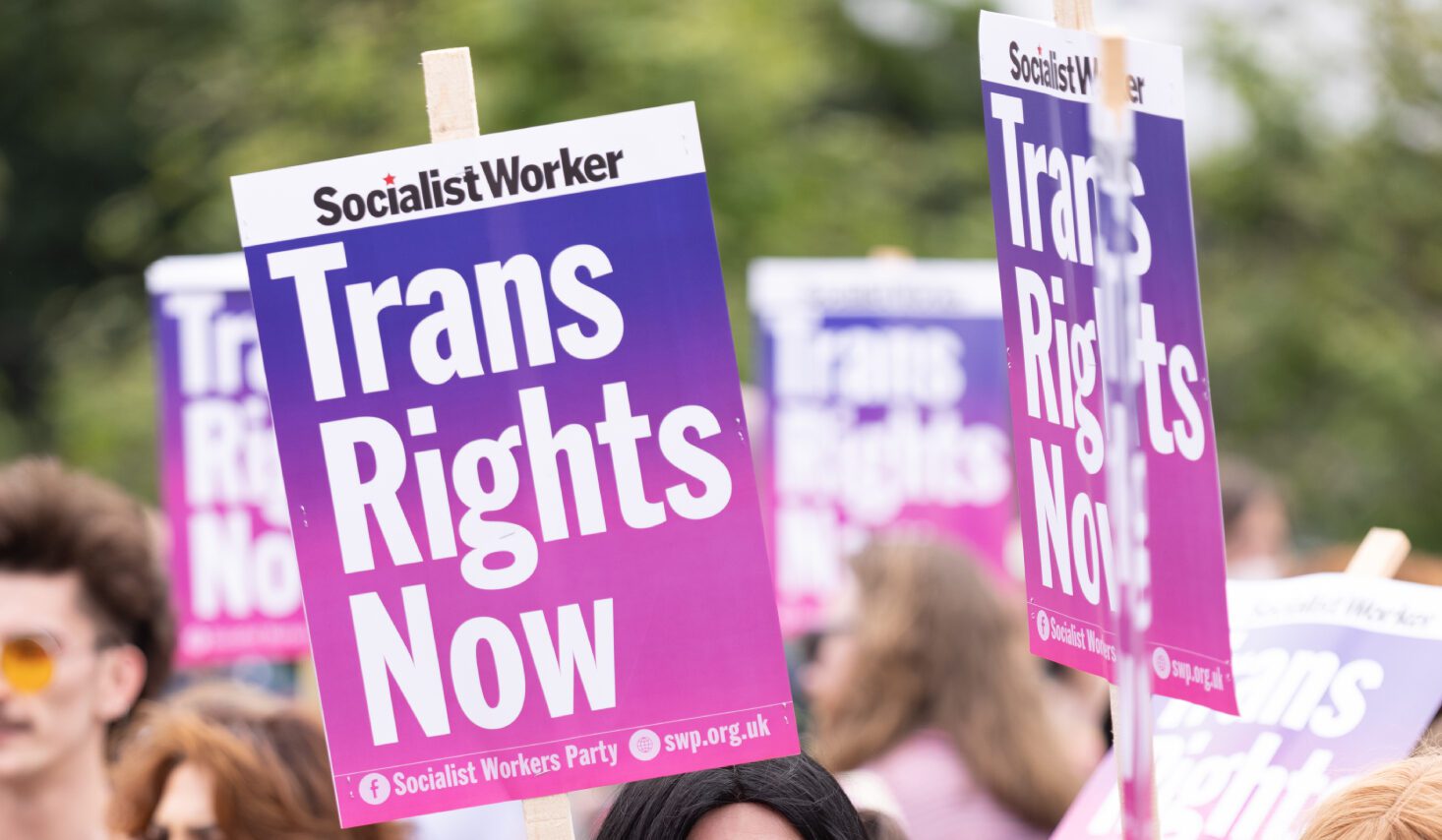
It’s understandable if you have never heard of the Equality and Human Rights Commission (EHRC), though as a member of the LGBTQ+ community it’s more important than ever to know about it.
In recent months, it has been facing increasing scrutiny for what Stonewall has called an “anti-trans stance”. It made headlines in January for suggesting a “differentiated approach” to a trans ‘conversion therapy’ ban and also called on Scotland to pause its gender recognition reforms in what some have called an “attack on trans equality”.
This, among other things, has resulted in LGBTQ+ activists questioning whether or not the EHRC is “truly fit for purpose” and ignited debate on how independent it is from the ruling Conservative Party.
Here, GAY TIMES dissects what the EHRC is, who runs it and why it has been causing so much controversy.
What is the Equality and Human Rights Commission?
The EHRC is a human rights body responsible for promoting and enforcing equality and non-discrimination laws in England, Scotland and Wales. Tony Blair’s Labour government introduced it as part of the Equality Act 2006 and it came into effect from October of the following year, now responsible for enforcing the Equality Act 2010.
Its website states that its “role is to help organisations achieve what they should, not catch them out if they fall short,” which it does so through carrying out research and giving advice to ensure equality laws are respected. The EHRC draws its powers to enforce these from the aforementioned Equality Act 2006, including the ability to use courts and tribunals to “reinforce, strengthen or expand people’s rights.”
The current polarised debate is causing much harm and distress to people on all sides. Everyone’s concerns should be discussed and addressed carefully, openly and with respect, to avoid further damage and division. (1/5)
— EHRC (@EHRC) January 26, 2022
It can also challenge policies and practices in both entire industries and smaller sectors, push what it considers priority issues further up the agenda and clarify the law where appropriate. It claims to not get involved in disputes, instead working neutrally to create change and drive equality.
“Our job is to help make Britain fairer,” the EHRC website also states. “We do this by safeguarding and enforcing the laws that protect people’s rights to fairness, dignity and respect.”
Who runs it?
The chair and commissioners, the EHRC’s most senior leaders, are appointed by the Minister for Women and Equalities, who is currently Liz Truss. It is funded by the UK government’s Equalities Office, but is considered separate from and independent of it – though it is accountable for its use of public funds.
Since December 2020, Kishwer Falkner, Baroness Falkner of Margravine, has been the head of the EHRC after being appointed by Truss. Falkner is also a non-aligned life peer in the House of Lords and was previously its Chairman of the EU Financial Affairs Sub-Committee from 2015 to 2019. She has also worked for the Liberal Democrats as its Director of International Affairs and Director of Policy and was appointed the University of Northampton’s inaugural chancellor in 2008.
The @EHRC response to the @GEOgovuk consultation on #conversiontherapy shows a significant change in its position & one has to now ask whether it is is truly fit for purpose? https://t.co/8qMvXK7smc pic.twitter.com/iJBZ3Psolq
— Jayne Ozanne (@JayneOzanne) January 27, 2022
The 66-year-old has faced intense criticism for her stance on LGBTQ+ rights, something which her predecessor, David Isaac, said was the result of the watchdog becoming politicised by the Conservative Party under her leadership. She is reportedly gender critical and, in May 2021, told The Times that women should have the right to question being transgender without fear of repercussion. In February 2022, VICE World News revealed that a number of anti-trans groups met with the equality watchdog under Falkner’s leadership – with some even being invited to meet with her personally.
Why has the EHRC been in the news so much recently?
As well as its controversial meetings, in January 2022 the equality watchdog called on the Scottish government to pause its plans to simplify the gender recognition process. Ministers in the country are currently seeking to update the system in order to make changing someone’s legally recognised gender a smoother process – with a bill expected at Holyrood sometime this year.
However, in a letter to Shona Robison, the Social Justice Secretary who is overseeing the proposed changes, Falkner suggested that “more detailed consideration” was required – despite the government already conducting two consultations on the plans. Although she agreed that “urgent improvements to gender identity services throughout Britain” are needed, she expressed her concerns over “those relating to the collection and use of data, participation and drug testing in competitive sport, measures to address barriers facing women and practices within the criminal justice system”.
We have written to the Scottish Government today about reform of the Gender Recognition Act.
Download and read our full letter here ⬇️https://t.co/nvQXr457vn
— EHRC (@EHRC) January 26, 2022
On 26 January, the same day the letter was sent, the EHRC published a report in response to the UK government’s plans to legislate a ban on so-called ‘conversion therapy’. It suggested delaying restrictions on practices targeted at transgender people until more information is available, and said the public consultation did not “address the possible need to consider a differentiated approach in relation to sexual orientation and being transgender so as to ensure, in particular, that clinicians and therapists are not prohibited from providing appropriate care and support for individuals with gender dysphoria.”
The EHRC also criticised what it called the “lack of evidence about conversion therapy in relation to being transgender,” and concluded that “these matters require further careful and detailed consideration before legislative proposals are finalised and the implications of them can be fully understood.”
Who has spoken out against the human rights watchdog?
The stance of the EHRC has been met with fierce backlash from LGBTQ+ groups. On 10 February, Stonewall confirmed that it has submitted documents to the United Nations (UN) and GAHNRI (the international accreditation body for human rights organisations) calling for a review into the EHRC’s status as an A-grade accredited human rights organisation.
“The submission is prompted by the EHRC’s recent, and significant, change in stance on the issue of trans rights,” its statement said. Stonewall’s submission is supported by the Good Law Project, with signatories including 19 LGBTQ+ charities and organisations such as TransActual, Mermaids and the LGBT Foundation, among many others. It has also launched a petition calling on the government to protect trans people using the Equality Act in the wake of revelations about the EHRC.
I share the concerns of @stonewalluk and dozens of LGBTQ+ organisations that the @EHRC is being influenced by the government's anti-trans agenda.
The EHRC has a duty to be independent and to protect all human rights.
Solidarity with those taking legal action. https://t.co/k5CSlq5LFw
— Nadia Whittome MP (@NadiaWhittomeMP) February 11, 2022
Jayne Ozanne, Chair of the Ban Conversion Therapy Coalition, told GAY TIMES that she was “perplexed” by the stance of the EHRC and questioned whether or not is is “truly fit for purpose”. Nadia Whittome, a Member of Parliament for the Labour Party, said she shares Stonewall’s concerns and believes the EHRC “is being influenced by the government’s anti-trans agenda.”
David Isaac, the EHRC’s aforementioned ex-chair, questioned the independence of the human rights body from the Conservative Party and accused it of making politically motivated decisions. He told The Guardian: “My view is that an independent regulator shouldn’t be in a position where the governments of the day can actually influence the appointments of that body to support a particular ideology.”
LGBTQ+ activist Peter Tatchell has been critical of the EHRC and said that “women’s safety is vital but not at [the] expense of trans rights.”
Trans charity Mermaids said that if the body succeeds in “delaying, restricting and/or removing the rights of trans people,” it “sets a dangerous precedent for all.”
LGBT+ groups call for @EHRC to lose international status over opposition to full trans equality. Women's safety is vital but not at expense of trans rights. Equality watchdog also accused of government interference & ‘politically motivated’ appointments https://t.co/uAwrpIcv0C
— Peter Tatchell (@PeterTatchell) February 13, 2022



